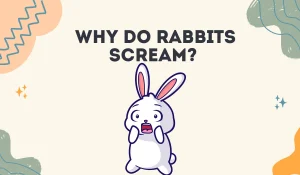Bunny shaking can be a concerning sight for any pet owner. There are several reasons why a bunny might shake, and it is important to understand the underlying cause to determine the appropriate course of action. Some of the most common reasons why bunnies shake include fear, anxiety, pain, discomfort, and infections.
One of the foremost reasons why bunnies shake is fear. As prey animals, rabbits are naturally wired to be cautious and easily frightened. Loud noises, sudden movements, and unfamiliar surroundings can all trigger fear in bunnies, causing them to shake and tremble. Similarly, anxiety can also lead to shaking in bunnies. Separation anxiety, for instance, can cause bunnies to shake and become restless when they are away from their owners or other familiar companions.
Another possible cause of bunny shaking is pain and discomfort. In some cases, bunnies may shake due to underlying health issues such as ear infections, dental problems, or gastrointestinal distress. It is important to keep a close eye on your bunny’s behavior and take note of any other symptoms they may be exhibiting, such as lethargy, loss of appetite, or changes in bowel movements.
Medical Reasons
Infectious Diseases
Rabbits can contract various infectious diseases that can cause them to shake. One of the most common infectious diseases is Pasteurellosis, which is caused by the bacteria Pasteurella multocida. This disease can cause respiratory problems, fever, and shaking in rabbits. Another infectious disease that can cause shaking is Encephalitozoonosis, which is caused by a parasite. This disease can cause neurological symptoms such as shaking, head tilting, and loss of balance.
Rabbits can also contract viral diseases such as Rabbit Hemorrhagic Disease (RHD). This disease can cause sudden death in rabbits, but in some cases, rabbits can exhibit symptoms such as shaking, fever, and lethargy.
Non-Infectious Diseases
Rabbits can also develop non-infectious diseases that can cause them to shake. One of the most common non-infectious diseases is dental disease. This can cause pain and discomfort in rabbits, which can lead to shaking. Another non-infectious disease that can cause shaking is arthritis. This condition can cause pain and stiffness in the joints, which can lead to shaking.
Rabbits can also suffer from gastrointestinal stasis, which is a condition where the digestive system slows down. This can cause discomfort and pain in rabbits, which can lead to shaking. Additionally, rabbits can develop tumors, which can cause shaking as a symptom.
Environmental Factors
Bunny shaking can be caused by a variety of environmental factors. Two of the most common environmental factors that can cause shaking in rabbits are temperature and stress.
Temperature
Rabbits are sensitive to temperature changes, so it’s important to keep their environment at a comfortable temperature. If a rabbit is too cold, it may shake to try to warm up. On the other hand, if a rabbit is too hot, it may also shake as a way to cool down. The ideal temperature range for rabbits is between 60 and 70 degrees Fahrenheit.
If a rabbit is shaking due to temperature, it’s important to adjust the environment accordingly. This may mean providing a heating pad or a fan, depending on the situation.
Stress
Stress can also cause a rabbit to shake. Some common sources of stress for rabbits include changes in their environment, loud noises, and being handled roughly. If a rabbit is stressed, it may shake as a way to release tension.
To reduce stress in rabbits, it’s important to provide a calm and consistent environment. This may mean keeping loud noises to a minimum, providing a comfortable living space, and handling the rabbit gently.
If a rabbit is shaking due to stress, it’s important to identify and address the source of the stress. This may mean removing the source of the stress or providing the rabbit with a safe space where it can relax.
Behavioral Reasons
There are several behavioral reasons why bunnies shake. In this section, we will discuss two of the most common ones: excitement and fear.
Excitement
Bunnies are known for their playful and energetic nature. Sometimes, when they get excited, they may start shaking. This is especially true when they are about to receive a treat or when they are playing with their favorite toy. It is important to note that this type of shaking is usually harmless and is a normal part of bunny behavior.
Other signs of excitement in bunnies include:
- Jumping and running around
- Binky (a happy dance where they jump and twist in the air)
- Chewing on toys or other objects
- Thumping their hind legs on the ground
Fear
On the other hand, shaking can also be a sign of fear in bunnies. This is usually accompanied by other signs of stress, such as hiding, crouching, or running away. Fearful shaking can be caused by a variety of factors, such as loud noises, unfamiliar people or animals, or sudden movements.
If your bunny is shaking due to fear, it is important to create a safe and comfortable environment for them. This may involve reducing noise levels, providing a hiding place, or gradually introducing them to new people or animals.
Other signs of fear in bunnies include:
- Freezing in place
- Flattening their ears against their head
- Hunching their body
- Panicked breathing
Conclusion
There are many reasons why a bunny may shake, and it’s important to identify the cause in order to provide proper treatment. Some common reasons for shaking include fear, illness, injury, hormonal changes, and overheating. In some cases, shaking may be a sign of a more serious condition, such as seizures or GI stasis. If you notice your bunny shaking frequently or exhibiting other concerning symptoms, it’s important to seek veterinary care right away.
Preventing shaking in rabbits involves providing a safe and comfortable environment, a healthy diet, and regular veterinary check-ups. Avoid exposing your bunny to loud noises or stressful situations, and monitor them closely for signs of illness or injury. If you suspect your bunny is overheating, provide them with a cool and shaded area to rest in and offer plenty of fresh water.
Understanding the reasons behind bunny shaking can help you provide the best possible care for your furry friend. By staying vigilant and seeking veterinary care when necessary, you can help keep your bunny healthy and happy for years to come.
How do you calm a shaking rabbit?
Provide a quiet, safe space: Create a calm and quiet environment for your rabbit to reduce stress and anxiety.
Speak softly and soothingly: Speak in a gentle tone of voice to reassure your rabbit and help them feel more secure.
Offer treats: Offer your rabbit some of their favorite treats or foods to distract them from their fear or anxiety.
Provide gentle physical contact: Petting or stroking your rabbit gently can help them feel more relaxed and calm.
Seek veterinary care: If the shaking persists or is accompanied by other symptoms, such as lethargy or loss of appetite, seek veterinary care immediately.
Why is my rabbit shaking when breathing?
Shaking when breathing in rabbits can be a sign of various underlying health issues, including respiratory infections, pneumonia, or heart disease. It is important to seek veterinary care immediately if you notice your rabbit experiencing any unusual breathing patterns or signs of distress. Your veterinarian can perform a physical examination, run diagnostic tests, and prescribe appropriate treatment to help address the underlying cause of the shaking. In some cases, medication or supportive care, such as oxygen therapy or fluid therapy, may be necessary to help your rabbit recover. Early intervention and prompt treatment can help improve your rabbit’s prognosis and ensure they receive the care they need.
Should I be worried if my bunny is shaking?
If your bunny is shaking, it is important to determine the underlying cause in order to determine if you should be worried. Shaking can be a sign of various health issues, including pain, fear, anxiety, or illness. If your bunny is showing other signs of distress, such as lethargy, loss of appetite, or difficulty breathing, you should seek veterinary care immediately. On the other hand, if your bunny is shaking their head or body in a playful or excited manner, there may be no cause for concern. It is always better to err on the side of caution and seek veterinary care if you are unsure about your bunny’s health or behavior.



